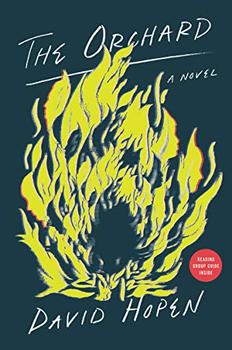Summary | Excerpt | Reading Guide | Reviews | Beyond the Book | Read-Alikes | Genres & Themes | Author Bio

This article relates to The Orchard
 In David Hopen's novel, The Orchard, the main action is set in motion by a discussion of the Jewish legend of Pardes. In the tale, four celebrated sages enter the orchard, but only one emerges unscathed by his encounter with the divine.
In David Hopen's novel, The Orchard, the main action is set in motion by a discussion of the Jewish legend of Pardes. In the tale, four celebrated sages enter the orchard, but only one emerges unscathed by his encounter with the divine.
The word "Pardes" comes from the ancient Persian word pairidaeza, which refers to an enclosed garden. The Pardes legend can be found in the Tosefta, an anthology of laws attributed to Jewish sages gathered between 0 and 200 CE, and the Talmud, the central book of rabbinic law, the first component of which — the Mishnah — was published around 200 CE. The legend is traditionally interpreted as a warning against the study of mysticism, and is meant to contrast the actions of three historic scholars — Ben Azzai, Ben Zoma and Acher — with the ideal, Rabbi Akiva.
The rather cryptic story goes like this: Ben Azzai, Ben Zoma, Acher and Rabbi Akiva entered the orchard. "Entering the orchard" has been commonly interpreted to mean that the four attained a kind of spiritual elevation or mystical experience, though it is not clear what exactly that experience was. Ben Azzai looked and died. Ben Zoma looked and was harmed. (Some versions of the story flip the fates of Ben Azzai and Ben Zoma.) Acher cut down the plantings. Rabbi Akiva entered in peace and left in peace. Although the story is generally thought to be allegory, the four men mentioned actually did exist and were well-known during their lifetimes.
Simon ben Azzai (also known as Shimon ben Azzai and Simeon ben Azzai) was a highly-regarded second-century Jewish scholar who studied informally with Rabbi Akiva. The passage of the Pardes legend that relates to him — that he looked and died — indicates that he looked at the face of God and could not survive the encounter.
The second sage, Simon ben Zoma (aka Shimon ben Zoma and Simeon ben Zoma) was a contemporary of Ben Azzai and is frequently mentioned with him. Ben Zoma was also a scholar, whose focus was on the first chapter of the Torah: Genesis. His intellect was so revered that a common saying stated that if one dreamed of him, the person would be granted wisdom. The Pardes legend says that Ben Zoma "looked and was harmed," and this is thought to mean that he couldn't bear the divine revelation and went insane.
Elisha ben Abuyah became known as Acher – "The Other One." A sage who lived in the first century, Acher was an extraordinary scholar who eventually became a heretic. There are different stories about why he grew disillusioned with Judaism, and many concern his love for worldly things forbidden by Judaic law, such as studying sacrilegious texts and consorting with prostitutes. His contemporaries considered his sins to be so grievous that they refused to utter his name (hence the sobriquet Acher). The legend of Pardes, which states he "cut down the plantings," is interpreted to mean that it was his encounter with divine knowledge that turned him into a heretic.
Rabbi Akiva, who was a sage in the late first and early second century, is perhaps the best known of the four mentioned in the Pardes legend. Born Akiva ben Joseph, he started life as a semi-literate shepherd and didn't begin his religious studies until the age of 40. He was revered as a scholar in his lifetime, and is credited with determining the final canon of the Tanakh (often referred to as the Hebrew Bible) as well as the systemization of the Mishnah. He's mentioned frequently in Jewish literature and liturgy, including in the Haggadah, a text recited during the Passover Seder. There's no indication in the legend as to how or why Rabbi Akiva survived his experience; the interpretation is left to each individual.
Rabbi Akiva, from the Mantua Haggadah, 1568. Unknown artist.
Filed under Places, Cultures & Identities
![]() This article relates to The Orchard.
It first ran in the November 18, 2020
issue of BookBrowse Recommends.
This article relates to The Orchard.
It first ran in the November 18, 2020
issue of BookBrowse Recommends.
Your guide toexceptional books
BookBrowse seeks out and recommends the best in contemporary fiction and nonfiction—books that not only engage and entertain but also deepen our understanding of ourselves and the world around us.